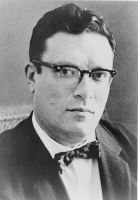阅读艾萨克·艾西莫夫 Isaac Asimov在小说之家的作品!!! | |||
「基地」、「我,机器人」 等系列是艾西莫夫最脍炙人口的代表作。这些看似各自独立的故事,相互贯串起来,竟是一部俯仰两万年的长篇史诗!艾西莫夫特意将科幻场景巨幅拉大,在全银河的背景下架构他独有的科幻世界、藉由银河帝国的兴亡史来讨论人性与政冶、经济、军事等文明要素产生的互动影响。这种宏观视野使他的作品处处闪动著关怀人类未来的笔触,超越一般科幻作品的局限。
艾西莫夫不仅是哥伦比亚大学的化学博士,更是世闻名的全能作家,一生著述多达百七十余本,内容广及科学类的数理化、天文、生物、医学,还旁涉人文类的文学、宗教、史地等。如此渊博的学识使他的笔下世界具备了奇幻的想像与高度的预言性。在他刚开始写机器人小说时,机器人学未发展出来;等到这门科技发展得相当有成果时,几乎每一本有关机器人学发展史的书籍都提到他、他的小说与他发明的「机器人三定律」。这定律几乎成了以后科幻作家创作有关机器人的作品时必须遵循的法则。
艾西莫夫以真确的物质科学及人文现象演绎出他的科幻世界,又杂进侦探与推理的小说技法,使得他的作品情节生动,扣人心弦,让人不忍释卷。
Isaac Asimov is widely considered a master of the science-fiction genre and, along with Robert A. Heinlein and Arthur C. Clarke, he was considered one of the "Big Three" science-fiction writers during his lifetime. Asimov's most famous work is the Foundation Series; his other major series are the Galactic Empire series and the Robot series, both of which he later tied into the same fictional universe as the Foundation Series to create a unified "future history" for his stories much like those pioneered by Robert A. Heinlein and previously produced by Cordwainer Smith and Poul Anderson. He penned numerous short stories, among them "Nightfall", which in 1964 was voted by the Science Fiction Writers of America the best short science fiction story of all time, an accolade that many still find persuasive. Asimov wrote the Lucky Starr series of juvenile science-fiction novels using the pen name Paul French.
The prolific Asimov also wrote mysteries and fantasy, as well as much non-fiction. Most of his popularized science books explain scientific concepts in a historical way, going as far back as possible to a time when the science in question was at its simplest stage. He often provides nationalities, birth dates, and death dates for the scientists he mentions, as well as etymologies and pronunciation guides for technical terms. Examples include his Guide to Science, the three volume set Understanding Physics, Asimov's Chronology of Science and Discovery, as well as numerous works on astronomy, mathematics, the Bible, William Shakespeare's works and, of course, chemistry subjects.
Asimov was a long-time member and Vice President of Mensa International, albeit reluctantly; he described some members of that organization as "brain-proud and aggressive about their IQs." He took more joy in being president of the American Humanist Association. The asteroid 5020 Asimov, a crater on the planet Mars, the magazine Asimov's Science Fiction, a Brooklyn, New York elementary school, and one Isaac Asimov literary award are named in his honor.
